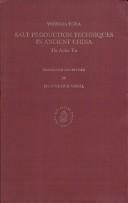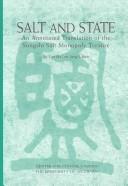| Listing 1 - 4 of 4 |
Sort by
|

ISBN: 0792341554 9401072779 9400917368 Year: 1996 Publisher: Dordrecht Kluwer
Abstract | Keywords | Export | Availability | Bookmark
 Loading...
Loading...Choose an application
- Reference Manager
- EndNote
- RefWorks (Direct export to RefWorks)
S10/0401 --- Optical fibers --- -Solitons --- -Pulses, Solitary wave --- Solitary wave pulses --- Wave pulses, Solitary --- Connections (Mathematics) --- Nonlinear theories --- Wave-motion, Theory of --- Light guides (Optical fibers) --- Fiber optics --- Fibers --- Optical materials --- Optical wave guides --- China: Economics, industry and commerce--Salt monopoly (incl. Yantielun) --- Congresses --- Solitons --- Congresses. --- -China: Economics, industry and commerce--Salt monopoly (incl. Yantielun)

ISBN: 9004096574 9004482695 Year: 1993 Publisher: Leiden : Brill,
Abstract | Keywords | Export | Availability | Bookmark
 Loading...
Loading...Choose an application
- Reference Manager
- EndNote
- RefWorks (Direct export to RefWorks)
Salt industry and trade --- Salt mines and mining --- History. --- S19/0160 --- S10/0401 --- China: Natural sciences--Technology, inventions --- China: Economics, industry and commerce--Salt monopoly (incl. Yantielun) --- History --- Mines and mineral resources --- Nonmetallic minerals industry

ISBN: 0892641630 0472901451 Year: 2004 Publisher: Ann Arbor Center for Chinese Studies, the University of Michigan
Abstract | Keywords | Export | Availability | Bookmark
 Loading...
Loading...Choose an application
- Reference Manager
- EndNote
- RefWorks (Direct export to RefWorks)
From its inception in the Han dynasty (206 B.C.-220 A.D.), the salt monopoly was a key component in the Chinese government's financial toolkit. Salt, with its highly localized and large-scale production, was an ideal target for bureaucratic management. In the Song dynasty (960-1279), fiscal pressures on the government had intensified with increased centralization and bureaucratization. A bloated administration and an enormous standing army maintained against incursions by aggressive steppe neighbors placed tremendous strain on Song finances. Developing the salt monopoly seemed a logical and indeed urgent strategy, but each actor in this plan -- the emperor, local officials, monopoly administrators, producers, merchants, and consumers -- had his own interests to protect and advance. Thus attempts to maximize the effectiveness of the monopoly meant frequent policy swings and led to levels of corruption that would ultimately undo the Song. Unlike other contemporary sources, the 'Songshi' treatise organizes its subject into an intelligible and detailed narrative, elucidating special terminology, the bureaucracy and its processes, and debates relating to Chinese finance and politics, as well as the salt industry itself. Professor Chien's extensive annotation relies on parallel histories that corroborate and supplement the 'Songshi' account, together providing a comprehensive study of this important institution in China's premodern political economy. Cecilia Chien is Assistant Professor in the Division of Humanities at the Hong Kong University of Science and Technology.
Government monopolies --- Salt industry and trade --- History. --- Song shi. --- China --- History --- Nonmetallic minerals industry --- Monopolies, Government --- State monopolies --- Government business enterprises --- Government ownership --- Monopolies --- Monograph on salt in the Shihuozhi of the Songshi --- Songshi salt monopoly treatise --- S10/0401 --- China: Economics, industry and commerce--Salt monopoly (incl. Yantielun)

ISBN: 1572313439 Year: 1996 Publisher: Redmond Microsoft press
Abstract | Keywords | Export | Availability | Bookmark
 Loading...
Loading...Choose an application
- Reference Manager
- EndNote
- RefWorks (Direct export to RefWorks)
S10/0401 --- Operating systems (Computers) --- AA / International- internationaal --- 654 --- China: Economics, industry and commerce--Salt monopoly (incl. Yantielun) --- Informatieverwerking. Bureautica. --- Computer operating systems --- Computers --- Disk operating systems --- Systems software --- Operating systems --- Microsoft Windows NT device drivers (Computer programs) --- Microsoft Windows NT (système d'exploitation des ordinateurs) --- Informatieverwerking. Bureautica --- Microsoft Windows NT. --- Microsoft Windows NT workstation --- Windows NT --- Windows 2000 --- Daytona (Computer file) --- Monograph --- Microsoft Windows NT (système d'exploitation des ordinateurs)
| Listing 1 - 4 of 4 |
Sort by
|

 Search
Search Feedback
Feedback About UniCat
About UniCat  Help
Help News
News